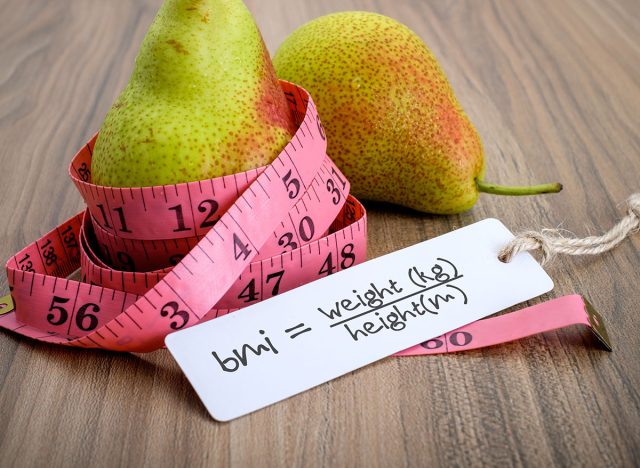Weight Gain In Middle Age Could Cut 5 Years Off Your Life, New Study Says

Like many Americans, you may not be pleased when you step on the scale after a long, inactive winter. But weight gain and being overweight is more serious than just an unpleasant number—it's associated with a plethora of health risks and even premature death. According to recent research, having excess body fat in middle age can cut your life by as much as five years.
Read on to learn more about this new study's findings on weight gain and being overweight. And next, be sure to check out The 6 Best Exercises for Strong and Toned Arms in 2022, Trainer Says.
The scary health risks of weight gain and being overweight

According to the National Institute of Diabetes and Digestive and Kidney Diseases, being overweight can increase your chance of health, social, and emotional problems. For instance, approximately 8 out of 10 individuals who have type 2 diabetes are also overweight. This can lead to other issues, including kidney disease, stroke, heart disease, nerve damage, and eye difficulties.
Being overweight raises your risk of developing high blood pressure, too. This condition can also burden your heart, injure your blood vessels, and create problems with your mental health, like depression. The list of health problems that stem from obesity/being overweight continues with fatty liver diseases, metabolic disorders, sleep apnea, and gallbladder disease (via NIDDK). But the scariest outcome of all? You could die prematurely, a new study reveals.
Related: 5 Bad Fitness Habits You Need To Ditch After 50, Trainer Says
New study reveals overweight, middle-aged decreased their life by as many as five years

Research published in the journal JAMA Network Open, conducted at Northwestern University, reveals a strong link between longevity and body mass index (BMI). They discovered that individuals considered overweight in middle age decreased their life by about five years sooner than non-obese people and have more health concerns to deal with (via AARP).
The study involved analyzing data for 29,621 individuals to identify a connection between obesity, BMI, and the cost of health care. The participants observed were 65 years of age and up. By the end of 2015 (the follow-up period), over 13,900 of the participants died.
Related: Speed Up Belly Fat Loss In Your 50s With These Exercises, Trainer Says
Higher BMI levels indicate a shorter lifespan and longer periods of dealing with health issues

The analysts grouped the deceased participants according to their BMI (which factors in their weight and height). According to the Centers for Disease Control and Prevention (CDC), a BMI range of 18.5 to 24.9 is considered a normal, healthy weight. (25 to 29.9 is overweight, and 30 or more is considered obese). They also observed the lifespan of the individuals. The study reveals that higher BMI levels indicate shorter longevity, in addition to longer periods of dealing with health issues (via AARP).
The participants in the obese group (a BMI exceeding 30)—which the researchers dubbed "class III obesity"— had a lifespan of 77.7 years of age. Those in the overweight group ("classes I and II obesity," BMI of 25 to 29.9) had a lifespan of 80.8 years of age. There was very little difference when comparing those in the normal group to the slightly overweight groups—they lived to 82.1 years of age.
The report in JAMA Network Open states, "Our findings provide evidence that overweight or obesity status decades earlier, in midlife, is independently associated with a greater cumulative burden of morbidity in older adulthood … This association also translated to higher health care costs in older adulthood. Resources and strategies are urgently needed at the individual and population level to address the growing public health challenge of excess weight in the context of an aging population."
For more…

For more mind and body news, check out The 5 Best Floor Exercises To Increase Your Visceral Fat Burn, Trainer Says and Speed Up Belly Fat Loss In Your 60s With These Floor Exercises, Trainer Says.







